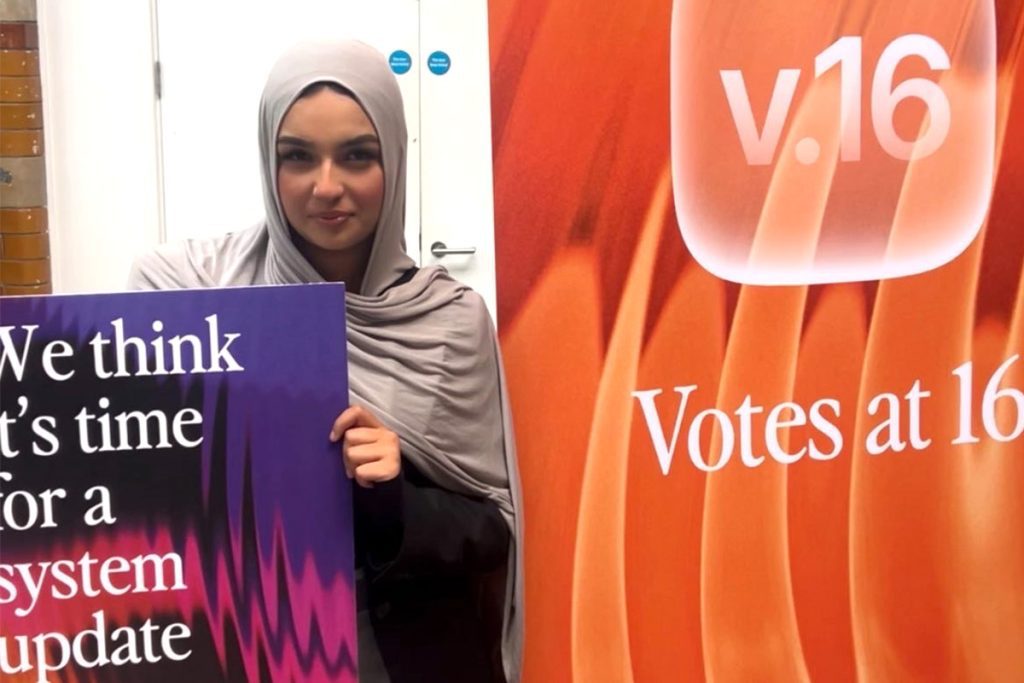With each generation, a new form of resistance emerges, shaped by the challenges it faces. For the 16-and 17-year-olds of today, one of the predominant challenges they faced – at least until very recently – was making their perceived right to vote a reality.
According to the Institute for Public Policy Research thinktank, just 52% of UK adults cast their ballots in the 2024 general election, which is the lowest since the vote was extended to all adults over 21 in 1928.
Democratic reform was needed, and the aspiring Labour Government seemed to agree, promising in its manifesto to extend suffrage to under-18s with the intention of increasing political engagement among young people. To ensure they stood by their word, young campaigners took it upon themselves to ensure that this pledge became a reality.
One of these campaigners is Ayah Mamode, an award-winning youth activist, who played a key role in the Votes@16 campaign with My Life My Say, the youth-led, non-partisan movement on a mission to encourage young people to participate in democracy. In a recent interview with Ayah, we explored the Votes@16’s campaign strategy, the challenges it faced and what’s next.
Meet the activist
Q: Introduce yourself
My journey began as the former Youth MP for Kensington and Chelsea. Since then, I’ve been involved in various campaigns. For example, advocating against food poverty, which contributed to the 2024 extension of free school meals for all primary school children across London.
Along the way, I was encouraged to engage with a range of organisations, which led me to My Life My Say. Through the movement, I joined the Votes@16 steering group alongside 15 other young people, helping to drive the campaign forward following the election of the Labour Government.
Q: What strategies worked best?
The campaign used the Labour manifesto as a foundation, but the journey was far from simple. We focused on understanding concerns and working to deconstruct these arguments through consultation. This was a crucial stage that shaped our path to success. That meant engaging with a diverse range of people, including teachers, doctors, civil servants and academics in the field, to better understand their views. We also engaged with the general public during demonstrations in Parliament Square to gain further insight.
Overall, we grounded our campaign in its criticisms, aiming to address each one through reasoned dialogue. This gave us a clear sense of the broader conversation surrounding Votes@16.
Q: What’s one thing you believe more charities or campaigns should know about running a campaign?
Campaigning is a difficult task. However, it’s often the little things along the journey that spark the biggest outcomes. As you know, Votes@16 is far from a new campaign, and all previous efforts have culminated in this result.
Secondly, involve young people! It’s as simple as that. Now that young people have the vote, they need to be mobilised and engaged in campaigns and discussions. Reach out to youth groups, hold consultations or offer opportunities to get involved.
Q: What’s next for the campaign?
Creating a curriculum for schools to include political literacy for young people to understand the intricacies of our political systems. This would include educating young people on the First Past the Post system and its workings, how to register to vote, voter ID requirements and more.
The curriculum would also include tips on spotting fake news, particularly with the rise of artificial intelligence, deepfakes are becoming even more prominent and threatening to our democracy. In most cases, young people are particularly vulnerable to deepfakes due to their proximity to social media.
Reflection
Ayah’s story is a testament to what happens when young people are actively engaged in political conversations and campaigns.
Her achievements are truly commendable, serving not only as an inspiration, but proof that youth engagement isn’t just possible but transformative.
Her story speaks volumes about the importance of treating young people not as passive recipients but as active contributors. When given the tools and platforms, their potential is endless. The work of Ayah and her peers through My Life My Say typifies this.
Why resist?
Ayah’s insights make one thing clear: young people are ready. So, what’s next?
The success of Votes@16 should serve as a reminder not only to policymakers but NGOs and charities more broadly, of the passion and power young people possess. Not only that, engaging young people and listening to their opinions and insights adds real depth to any campaign. And as a demographic that now possesses the power to vote, it’s more important than ever that we do so.
Young people are ready. They’re just waiting for you to let go and trust them with the future – because it belongs to them.
If youth advocacy is part of your mission, let’s talk. We’re always open to collaborations. Get in touch info@forster.co.uk
